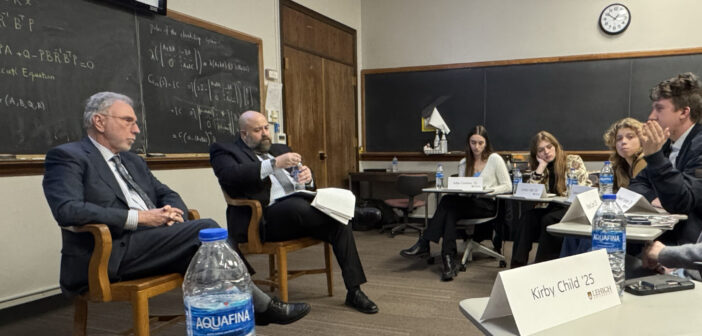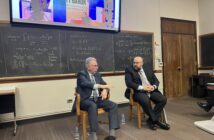Marty Baron, 76 ’76G ’14H, former editor in chief of The Washington Post, The Boston Globe and The Miami Herald, and a former senior editor of The New York Times and The Los Angeles Times, addressed a full auditorium in Packard Lab to discuss the role of media in contemporary society today, as part of Lehigh’s Compelling Perspectives series.
Compelling Perspectives is a speaker series in which leaders in fields related to the year’s theme are invited to take part in a conversation with the Lehigh community. This year experts in journalism and media are invited to discuss the role of media in contemporary society.
Lehigh President Joseph Helble led the conversation across a variety of topics including politics, the future of journalism, and misinformation, and Baron shared his views on the importance of objectivity, political media coverage and the villainization of mainstream media.
Baron began his journalism career in high school, contributing ton his school newspaper and gaining experience working with other local publications. At Lehigh,, he became editor in chief of The Brown and White during his junior year before entering the workforce and holding leadership positions on renowned national publications.
One of Baron’s most notable roles was his editor in chief position at The Boston Globe, which he held as the publication’s staff worked to investigate and ultimately expose cover-ups of child abuse by local Catholic Churches.
Regarding reporting on sensitive topics such as this, Baron said when there’s evidence of wrongdoing, it’s a journalist’s oligation to report the truth.
“The first thing is to do it,” Baron said, after being asked about how to approach reporting on such a sensitive topic. “You must treat people with respect but also get information from them.”
While acknowledging the challenges of investigating an institution like the Catholic Archiocese, he said free press exists for a reason, which is to hold powerful individuals and institutions accountable.
Baron referenced confirmation bias — people’s tendency to process information by looking for, or interpreting, information that is consistent with their existing beliefs — as a common issue in news consumption.
“We don’t share a set of common facts anymore,” Baron said. “People want to go to stories that confirm their pre-existing worldview.”
He said confirmation bias also shows up on the reporting side, and he’s concerned that a lot of reporters think they have all the answers before they even begin reporting.
“I ask, well, what is reporting? If you already know the answers of what you’re reporting, is that not only an exercise in confirmation bias?” Baron said. “Start with an open mind, and think of the questions that need to be answered.
With the rise of influencers spreading both news and disinformation, it can be difficult to tell what sources are reliable. While social media can give a “voice to the voiceless,” Baron said there’s also a lack of editorial oversight.
He said in a newsroom, there are editors to ensure you have available resources, fact checks, and are able to get comments from the necessary sources. Influencers, however, can say whatever they want on their platform, sometimes anonymously.
Baron said this issue has only been exacerbated since the 2024 presidential election, as president-elect Donald Trump has called for the villainization and criminalization of journalists.
Election coverage was run very similarly every year until 2015, when hostility began to occur, Baron said.
He said since Trump was elected in 2016, he’s worked to get people to see journalists as “enemies of the people” causing a type of “demonizing and dehumanizing of the press” that he’d never previously witnessed to this degree.
Baron said many of his staff and himself were threatened and harassed to such a degree that there were points they needed 24-hour security, and heexpressed concern about the legal safety of journalists during the new Trump administration.
“Trump is salivating for the opportunity to put journalists in jail,” Baron said.
This sentiment, he said, projects the beliefs of many Americans. He thinks Trump was elected because the average American didn’t see their needs being acknowledged by “the elites,” which many see journalists as a part of.
“People must see their needs are truly seen in the media, which we (journalists) don’t do a good enough job with,” Baron said.
He said being transparent with readers is the most important thing a publication can do to restore the public’s trust in media.
“Take them to original documents and audios and videos and data sets and say ‘Here’s our work,’” Baron said. “Now we’re giving (you) the opportunity to check it.”
The standards of journalism have eroded, particularly in recent years with the political climate, and Baron said readers misunderstand and mischaracterize objectivity.
Baron also discussed his belief that journalism is important to democracy. He said once can’t exist without the other.
“We have the free press in the United States because of the First Amendment,” Baron said. “(We have) the right to freely examine public characters and measures.”
While highlighting how a journalist’s analysis and ability to “look behind the curtain” gives the public the information they need for self-governance, he said the role of journalists extends beyond simply reporting facts.






Comment policy
Comments posted to The Brown and White website are reviewed by a moderator before being approved. Incendiary speech or harassing language, including comments targeted at individuals, may be deemed unacceptable and not published. Spam and other soliciting will also be declined.
The Brown and White also reserves the right to not publish entirely anonymous comments.